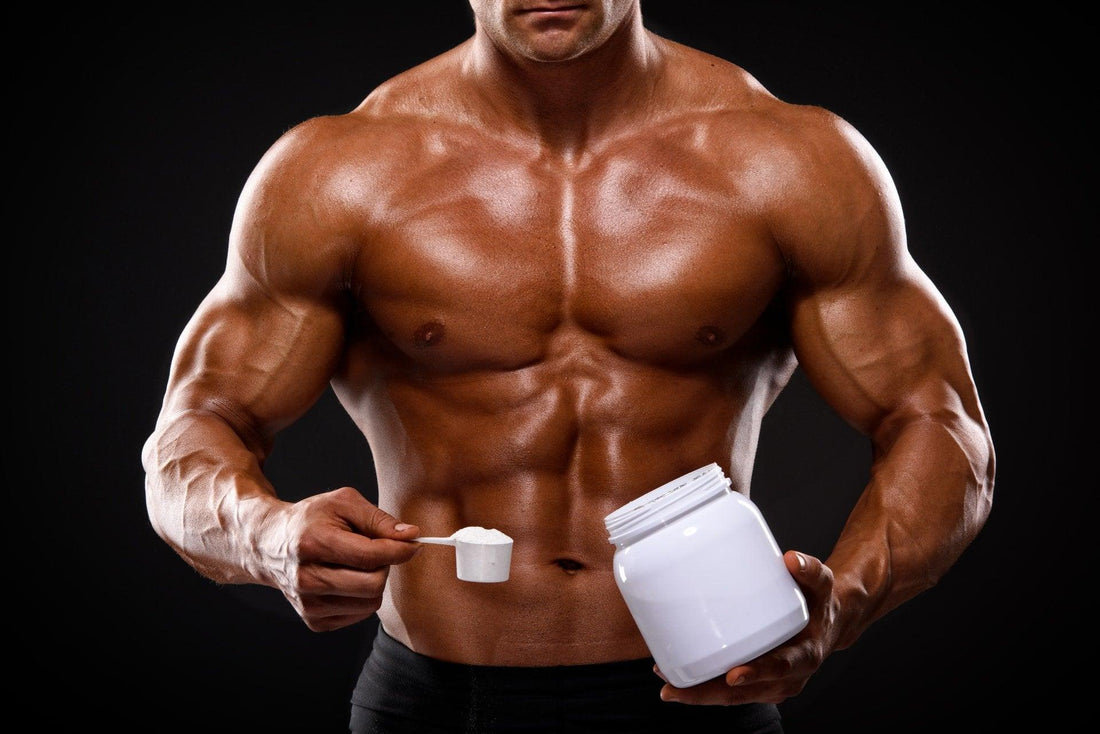

Top 10 Reasons to Use Creatine Monohydrate Year Round
Table of Contents
Top 10 Reasons to Use Creatine Monohydrate Year Round
- Creatine Causes Dehydration
- Creatine Causes Muscle Cramps
- Creatine Causes Kidney Disease
- You Must take Creatine with Grape Juice
The top few bullet points are all myths about creatine that have spread over the past few years. Creatine is just about the most effective and cheapest supplement that you can purchase. In a meta-analysis published in 2003, 43 out of 67 studies showed that creatine supplementation led to increased lean and body mass in young and middle-aged adults.
Some people are creatine non-responders, but the percentage of the population that does not respond to creatine is very small. The use of creatine supplements is well established for athletes seeking to gain an edge in their performance and recovery within multiple athletic and fitness fields.
Consequently, creatine has become the biggest selling sports supplement in the country, and it is widely used by football and baseball players, weight lifters, bodybuilders, MMA athletes, Cross-Fitters, sprinters, and millions of fitness buffs. Creatine is by far the most effective, legal sports supplement on the market.

Creatine monohydrate is perhaps the most effective performance-supporting nutritional supplement currently available to athletes for increasing high-intensity exercise capacity and lean body mass during training. Approximately 95% of the creatine in the body is located in skeletal muscle. It helps to supply energy to all cells, primarily muscle, by increasing the formation of Adenosine TriPhosphate (ATP) acting as cell energy reserve also for muscle contractions. Creatine’s primary process in the body is to store high-energy phosphate groups in the form of phosphocreatine. During periods of stress, such as training, phosphocreatine releases this energy to aid cellular function.
This process is what causes creatine to increase strength but can benefit almost every body system, including the brain, muscles, bones, and liver. Most benefits of creatine occur through this energy mechanism. Creatine in a 3-gram daily dose is scientifically shown to increase performance in the successive burst of short-term, high intensity exercise like weight training and interval cardio. As one of the most popular supplements used in the athletic industry, creatine has been utilized by all types of athletes throughout the years to help promote power output, muscular energy, strength, endurance, and repair. A naturally occurring substance in the human body, supplementing with creatine has been shown to increase the formation of adenosine triphosphate (ATP) to help optimize and prolong your training sessions.
In this article, I am going to list the top reasons to use creatine year round.
1.) Creatine Lowers Myostatin and Increases Muscle IGF-1
As one of the most popular supplements utilized in the athletic industry, creatine has been utilized by all types of athletes throughout the years to help promote power output, muscular energy, strength, endurance, and repair. A naturally occurring substance in the human body, supplementing with creatine has been suggested to increase the formation of adenosine triphosphate (ATP) to help optimize and prolong your training sessions. In 2008, researchers reported something shocking; a 10-day creatine supplementation regimen stimulated genes related to anabolic signal transduction.
2.) Creatine Increases Resting Testosterone and Reduces Cortisol
Results of another study suggest that more than five days of creatine supplementation when combined with resistance exercises, is sufficient for increasing testosterone concentrations and decrement in cortisol levels. Twenty active males were randomly assigned to either a creatine group or placebo group. During each resistance training session, subjects performed three sets ×ten-repetitions of nine exercises that included: Bench press, shoulder press, lat pull down, arm curl, squats, leg press, leg extension, leg curl, and abdominal crunches. The intensity of program was determined at 75 or 85% of one repetition maximum. A minute break between sets of the exercise was allowed for rest. At the end of the study, subjects of the Creatine group showed significant increases in testosterone concentrations and decreases in cortisol levels, in comparison with placebo and baseline, after five and seven days of creatine loading. Results of the study suggest that more than five days of creatine supplementation, associated with resistance exercises is sufficient for increasing testosterone concentrations and decrement in cortisol levels. If you’re not taking creatine, this is the perfect study to get you motivated to take creatine monohydrate.
3.) Creatine Reduces Muscle Damage and Soreness
Creatine may be a useful dietary supplement for preventing muscle damage and facilitating recovery from high-intensity exercise, which applies to the sports rehabilitation field. In the most recent article published in the Journal of Exercise Rehabilitation titled, “Role of creatine supplementation in exercise-induced muscle damage: A mini review” researchers discuss the many benefits of creatine for increasing muscle recuperation. The ergogenic effect of creatine is well-known to improve exercise performance such as explosive muscle power and increased lean body mass after resistance exercise. Several studies have reported that creatine reduces exercise-induced muscle damage. The study showed that healthy males ingesting creatine beginning five days before exercise until 14 days after exercise improved maximal isometric strength and decreased markers of muscle damage (i.e., creatine kinase) compared with those who consumed a carbohydrate placebo only. Some potential mechanisms explain the effect of creatine on exercise-induced muscle damage, including reducing inflammatory response, oxidative stress.
| 4.) Creatine Monohydrate Results in Similar Increases in Strength as Creatine HCl and Creatine Nitrate |
Creatine Hydrochloride (CrHCl) is a new form of creatine that is supposed to be 41 times more soluble in water than creatine monohydrate. The authors then propose that greater solubility and permeability could decrease the amount of creatine needed to fill the muscle. That would mean more absorption, less creatine excretion, and less gastrointestinal discomfort. Many companies claim that creatine HCL results in greater increases in muscle strength than creatine monohydrate. A new study published in the Journal of Food and Nutrition Sciences reports that creatine HCL results in the same increases in muscle strength as creatine monohydrate. Researchers from Brazil compared the effects of two different doses of creatine HCl (1.5 g and 5 grams of Creatine HCl) with creatine monohydrate (5 grams) on the strength and body composition of recreational weightlifters. All groups performed four weeks of strength training, and they were asked to maintain four weeks without participating in any regular physical exercise before the start of the training program.
5. Creatine Nitrate is creatine is bonded with nitrate.
Nitrates have been well documented to increase muscle blood flow and improve performance. Creatine Nitrate has been promoted to have two desirable effects on performance: Creatine for strength and Nitrate for pumps. To date, there has been no documented research that compared creatine nitrate to the gold standard creatine monohydrate. Researchers performed two studies to determine the safety and exercise performance characteristics of creatine nitrate supplementation which was recently just published in the prestigious journal of the International Society of Sports Nutrition.
| 6.) Creatine Increases Glycogen Replacement |
Creatine has been found to increase muscle strength and muscle mass, but new research suggests that creatine may increase glycogen replacement better. Creatine plays a significant role in rapid energy provision during muscle contraction involving the regeneration of ATP.
Creatine supplementation has become a common practice in both recreational and professional athletes. As most research on creatine has focused on the ergogenic capacity of creatine loading, far less attention has been attributed to the potential of creatine to affect muscle glucose metabolism. As an increase in muscle glycogen synthesis should probably be accompanied by an increase in muscle glucose uptake, it has been speculated that creatine supplementation might up-regulate GLUT-4 expression (GLUT4 is the insulin-regulated glucose transporter found primarily in adipose tissues and striated muscle (skeletal and cardiac.) in muscle tissue.
| 7.) 2 g of Creatine: No Water Retention/Weight Gain |
Most women avoid taking creatine because they are fearful of excess weight gain. Previous research has shown that creatine loading with 20-30 grams a day of creatine can result in water retention. During the loading phase of creatine, as creatine becomes saturated in the cell, an increasing amount of water is drawn into the muscle cell to compensate for the increased concentration of creatine in the cell. This loading process, therefore, typically results in a water weight gain of a pound or two (or more). Women should realize that the water retention effects of creatine can be completely avoided if low doses are consumed.
8.) Creatine Better Post- Exercise
Much like there is new research on the benefits of protein timing after resistance exercise influencing muscle protein synthesis, there now seems to be a creatine timing as well. In the past, most people thought it did not matter when you took creatine, but new research suggests you may want to take creatine after you exercise for best results. Creatine supplementation in proximity to resistance training may be a major strategy for increasing muscle mass and strength; however, it is unknown whether creatine supplementation before or after resistance training is more effective for aging adults. Using a double-blind, repeated measures design, older adults (50–71 years) were randomized to 1 of 3 groups: creatine before, creatine after, or placebo for 32 weeks. Before and following the study, body composition (lean tissue, fat mass; dual-energy X-ray absorptiometry) and muscle strength (1-repetition maximum leg press and chest press) were assessed. Creatine taken after exercise resulted in greater improvements in lean muscle mass compared with placebo. Creatine supplementation, independent of the timing of ingestion, increased muscle strength more than placebo. Compared with resistance training alone, creatine supplementation improves muscle strength, with greater gains in lean tissue mass resulting from post-exercise creatine supplementation.
9.) Creatine is an Anti-Aging Supplement
A more recent meta-analysis comprising 357 older adults demonstrated that creatine supplementation during resistance training can enhance muscle mass gain, strength, and functional performance over resistance training alone. A new meta-analysis review (i.e. collection of studies) published in the Journal of Nutrition and Health Sciences assessed the current literature on whether creatine supplementation in the presence of resistance training enhances physical performance in older adults above and beyond those undertaking resistance training alone or only taking creatine supplements. While reports are conflicting, there is good evidence to suggest that creatine supplementation with resistance training increases muscular endurance, lower body strength, and lean body mass; this is above results obtained with creatine supplementation or resistance training alone. The increased muscle mass observed with training has previously been shown to lead to increased bone mineral content and an associated reduced fracture risk; however, the additional benefits of creatine supplementation on this are less clear, and more work is needed to confirm whether exogenously taken creatine will benefit bone mineral density.
10.) Creatine Stacks Well with Beta Alanine and Caffeine
Supplementation with creatine can increase the total resistance training volume. Creatine has synergistic effects with other supplements such as beta alanine and caffeine. It is suggested that the increase in skeletal muscle PCr and carnosine concentrations via supplementation with creatine monohydrate and beta-alanine, respectively, will work synergistically to delay fatigue by increasing work capacity. A previous study reported that both creatine and beta-alanine were combined in a multi-ingredient supplement, it improved lower body muscular endurance, body composition, and strength and even reduced muscle fatigue during exercise.
It was observed that the acute ingestion of caffeine (5 mg/kg 1 h before the test) after six days of creatine loading improved time to exhaustion during running on the treadmill at 125 % of maximum oxygen uptake by over 10 % compared with baseline and placebo trials. Another study reported that caffeine ingestion after creatine loading improved intermittent high-intensity sprint performance. In the study, twelve physically active males were assigned to either creatine, caffeine, or creatine and caffeine groups. In this test, mean and peak power were increased after creatine and caffeine supplementation during the trial compared with baseline.

Creatine supplementation in the elderly may lead to increased muscle mass, endurance and performance, and those who undertake resistance training may show further improvements with creatine supplementation. However, for older subjects who do not partake in resistance training, creatine supplementation offers significant improvements in increasing muscular mass and strength and improving their quality of life, while these benefits are lower on the whole than those who undertake regular resistance training. Overall, it cannot be denied that the benefits of resistance training in the elderly on both muscle and bone health are substantial and well documented.
However, despite evidence being inconsistent in some reports, creatine supplementation is clearly a useful supplement that has the potential to improve strength, endurance, and quality of life in the elderly, even if taken in the absence of resistance training. To summarize this section, acute and chronic creatine supplementation can improve lean mass and muscle function in older populations. Importantly, creatine in conjunction with resistance training can result in greater adaptations in skeletal muscle as compared with resistance training alone.
Naderi A, Earnest CP, Lowery RP, Wilson JM, Willems ME. Co-ingestion of Nutritional Ergogenic Aids and High-Intensity Exercise Performance. Sports Med. 2016 Apr 12. Review.
Gualano B, Rawson ES, Candow DG, Chilibeck PD. Creatine supplementation in the aging population: effects on skeletal muscle, bone and brain. Amino Acids. 2016 Apr 23.
Creatine Supplementation in the Elderly: is Resistance Training Really Needed? Moon A, Heywood L, Rutherford S and Cobbold C. Journal of Nutrition and Health Sciences. Volume 2, Issue 1. ISSN: 2393-906.
Candow DG, Vogt E, Johannsmeyer S, Forbes SC, Farthing JP. Strategic creatine supplementation and resistance training in healthy older adults. Appl Physiol Nutr Metab. 2015 Feb 26:1-6.
Rawson ES, Stec MJ, Frederickson SJ, Miles MP. Low-dose creatine supplementation enhances fatigue resistance in the absence of weight gain. Nutrition. 2011 Apr;27(4):451-5.



















